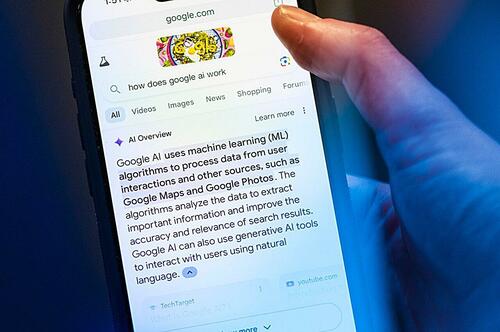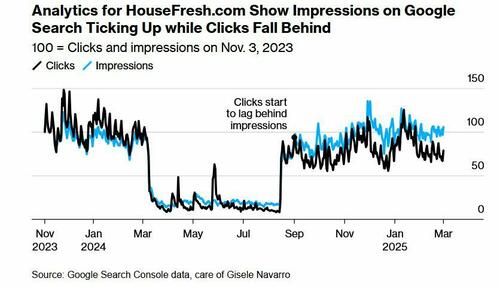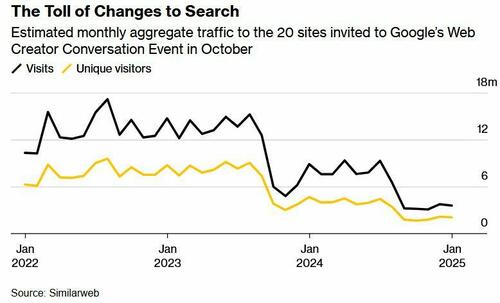
’Betrayed, That’s The Word’: Small Business Owners Reel as Google AI Destroys Google Search
In March 2024, Morgan McBride stood in her half-renovated kitchen posing for a photo shoot. The images were for a new Google ad campaign, a celebration of the ways the search engine had empowered her family’s do-it-yourself home improvement site, Charleston Crafted, to flourish. Just weeks later, she said, traffic from Google dropped more than 70%.
 Morgan McBrideSource: Morgan McBride (via Bloomberg)
Morgan McBrideSource: Morgan McBride (via Bloomberg)McBride had weathered Google algorithm changes before. But this time, the recovery never came. She suspects that more of her readers are getting advice from Google’s AI-generated summaries, which now appear prominently atop many search results – sometimes giving renovation tips that she says are incorrect or potentially unsafe. “You can’t just sit around waiting for things to turn around,” she said. Advertising revenue on her site has since dropped by 65%, costing her tens of thousands of dollars.
These summaries often draw directly from websites – like Charleston Crafted – but don’t send users to them, according to a report by Bloomberg. That’s left publishers like Gisele Navarro, managing editor of HouseFresh, watching as her content appears in summaries without translating into clicks or revenue. Internal analytics, which she shared with Bloomberg, show a growing share of impressions without traffic.
Across the web, independent publishers are reporting similar experiences. The rise of Google’s AI Overviews – which deliver synthesized answers from across the internet – along with a series of search algorithm changes, has upended the traffic patterns many small websites once relied on. Bloomberg, which conducted interviews with 25 publishers and digital experts, found widespread concern that Google’s shifting strategy is unraveling a symbiotic relationship that has powered the internet for years: websites provide helpful content, and Google delivers the audience.
Now, many creators say they’re being cut out of the equation entirely.
According to SEO expert and digital marketer Pritam Ghosh (citing a recent study by BrightEdge), Google’s AI overviews dominate 74% of problem-solving queries.
Key Insights by Query Category
Analyzing over 100,000 keywords, BrightEdge categorized searches into four types and tracked AI Overviews’ presence:
- Problem-Solving Queries: 74% (e.g., “how to fix a leaky faucet”)
- Informational Queries: 63% (e.g., “what causes climate change”)
- Navigational Queries: 13% (e.g., “Facebook login”)
- Transactional Queries: 5% (e.g., “buy running shoes”)
The data suggests Google prioritizes AI-generated answers for complex, research-based searches, while minimally using them for navigational or commercial intent queries.
Impact on Click-Through Rates (CTR)
AI Overviews significantly alter user engagement:
- When AI Overviews appear in position #1, organic CTR drops by 25% compared to traditional “blue link” results.
- These AI-driven responses dominate visibility, appearing in the top five positions for 87% of queries where they’re triggered.
A Fractured Compact
Google has denied that AI Overviews is the root cause of these sharp traffic declines, saying it is “misleading to make generalizations about the causes” based on individual cases. The company attributes changes in web traffic to seasonal trends, evolving user preferences, and its regular search updates.
Still, evidence of broader disruption is mounting. An analysis by the data firm Similarweb – conducted at Bloomberg’s request – found consistent declines across 67 small publisher sites in categories including lifestyle, travel, DIY, and cooking. Travel sites saw the sharpest losses, coinciding with Google’s introduction of robust AI-generated content in that domain.
Privately, Google has acknowledged the challenges. In October, the company invited about 20 web creators to its headquarters in Mountain View, Calif., for a closed-door meeting. There, according to attendees, Google’s search team apologized and said the sites represented the kind of high-quality content it wanted to highlight. But officials also admitted they could not guarantee a return to previous traffic levels — the search experience had fundamentally changed.
Mike Hardaker, who runs Mountain Weekly News, shared during that meeting that his site had once generated $250,000 in revenue. By late 2024, he was relying on a food bank. “I need to know as a business owner, and personally, if you think there’s a chance that some of our sites have the ability to recover,” he asked at the time. Google’s chief search scientist, Pandu Nayak, apologized – but offered no assurances.
Digital marketing firm Semrush reports the same pattern: more content visibility within Google, but fewer visits to the actual websites.
Raptive, a media company representing over 5,000 creators, estimates publishers could ultimately lose up to 25% of their traffic to AI Overviews. Google, for its part, says it is delivering “high-quality clicks,” but hasn’t released detailed data. BrightEdge, a data firm, found that the top beneficiaries of AI Overviews traffic are giants like Wikipedia, TripAdvisor, and YouTube — the latter being owned by Google itself.
Other changes – such as recipe summaries Google is piloting – are also raising alarms. While some participating food bloggers are receiving compensation, Raptive estimates that overall traffic to food sites could fall by half if the feature is rolled out more broadly.
“The big fear,” said Lisa Bryan, creator of the food site Downshiftology, speaking on behalf of fellow bloggers, “is that Google is severing the relationship that we have with our communities and our audiences.”
The power dynamic between Google and publishers has always been unequal. But some creators say the balance has tipped into unsustainable territory.
“I don’t understand how Google thinks this is sustainable,” said Jake Boly, founder of That Fit Friend, a site that reviews training shoes. “If you drive away all enthusiasts and small publishers, then we’re going to be overrun by spam and the few players who can afford to pay to play.”

The results, critics say, are already showing. Some AI-generated summaries have surfaced bad or bizarre advice. Laura Longwell of Travel Addicts said Google is recommending places to go to the beach near Philadelphia based on advice from a luggage storage company and a driving school. “The idea that any of that is based on experience or expertise is laughable,” she said.
Google continues to push its EEAT framework — emphasizing Experience, Expertise, Authoritativeness, and Trustworthiness — but even sites that align with those principles say they are being punished. “For years, Google has had the audacity to gaslight us, saying, ‘Don’t write for search,’” said Hardaker. “Well, then, who am I writing for?”
’Betrayed, That’s the Word’
For some creators, the damage is already irreversible.
Toronto-based couple Dave Bouskill and Debra Corbeil launched their travel blog The Planet D in 2008. For years, Google Search was their lifeblood, eventually driving 90% of their traffic. When AI Overviews rolled out, traffic dropped by half. It kept falling. Revenue plummeted. They laid off staff. Eventually, they stopped updating the blog.
They’ve since pivoted to YouTube, another Google property, to try and rebuild their audience. But the sting remains.
“I do feel betrayed by Google,” Bouskill said. Corbeil cut in: “Betrayed, that’s the word.”
Tyler Durden
Mon, 04/07/2025 – 14:25











